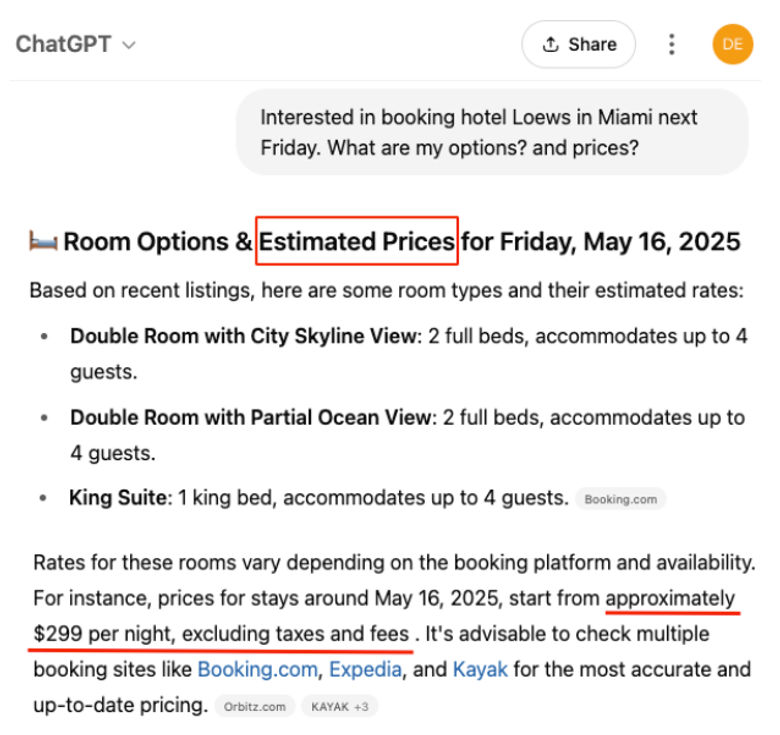No artificial intelligence (AI)-powered hospitality distribution models offer live pricing for hotels. So far, these platforms only display estimated prices. This is a huge weakness when it comes to driving actual bookings and explains why AI hasn’t been
a game changer yet.
But 2025 could be the year that changes all that, and it is certainly just a question of time. This is where “ARI” comes into play. ARI stands for “availability, rates, inventory,” and it’s the next frontier in hospitality distribution AI. Can you imagine
when AI returns final exact prices? As of today, this is a simulation.
Travel tech companies—mostly online travel agencies (OTAs), property management systems (PMSs), channel managers and major booking engines—offer their own application programming interfaces to pull ARI from in real time. Existing metasearch players such
as Google Hotels and Tripadvisor use these APIs and redirect customers to the different sites (hotel websites and OTAs).
However, maintenance and scalability have been a big issue.
Will AI platforms follow and implement these APIs or try a new approach?
MCP: The bridge between AI and real-time ARI?
Model Context Protocol (MCP) offers a standardized and scalable framework for enabling large language models to access diverse data sources and tools in a scalable manner.
This advancement allows AI-based platforms such as ChatGPT, Gemini and Perplexity to integrate real-time data from hotel technology providers—including PMSs, revenue management systems, channel managers, revenue management systems and booking engines.
As a result, these platforms can extend their role beyond destination and hotel discovery, offering real-time availability, pricing and potentially even end-to-end booking capabilities—without users needing to leave the AI interface.
Subscribe to our newsletter below
In
theory, transactional functionality could also be embedded, enabling direct bookings through AI agents. This is certainly a potential scenario. However, it’s uncertain whether this aligns with the preferences of both consumers and hospitality providers.
Similar initiatives—such as “Book on Google” and Tripadvisor’s “Instant Booking”—faced adoption challenges and were ultimately discontinued. In addition to market appetite, several critical barriers remain, including data security, payment integration,
user privacy and brand loyalty.
Finally, while MCP presents a compelling vision—particularly for enterprise and domain-specific use cases—it remains an early-stage concept. Adoption is still limited and highly dependent on organizational scale, technical readiness and strategic alignment.
What can hotels do today?
It’s in hotels’ interest to show their real-time, direct prices in new placements, especially if they are growing triple digit in share. However, intermediaries (mostly OTAs) also have their real-time ARI and are much more technologically advanced. Who’ll
take the lead?
If hotels remain passive, OTAs will occupy these new spaces and drive these traffic and bookings to them. Nevertheless, hotels can start preparing for when the time comes. A quick guide would be:
- Familiarize yourself with metasearch fundamentals. Gain a thorough understanding of metasearch platforms, their key drivers (such as price accuracy and price competitiveness) and performance metrics (or KPIs such as impression share and participation
rate). This will allow you to leverage metasearch for AI readiness, as many AI tools are likely to rely on metasearch platforms for real-time availability and pricing data. - Ensure your properties are already listed on key platforms such as Trivago, Tripadvisor and especially Google Hotels. It is a real possibility that AI companies partner
with existing metasearch players to show hotels’ real-time prices. Google Hotels Ads are already shown in Gemini, indicating that Google has an advantage and is using. - Have your properties sites indexed by AI search engines. Proactively reach out to AI providers and inquire about the steps required to index your website and display your real-time prices. There is no such thing as “submit your URL to Google” as it
wasn’t at the beginning when Google used Dmoz directory to get the URLs to index. But things will change soon. - Make sure you build your live price feed. Larger groups should consider investing in their own API and have it ready to respond to millions of requests per day. Smaller chains and independents should find solid third-party hotel tech companies to
do the job by integrating directly to the PMS or central reservation system. AI platforms will demand ARI information in real time when the time comes. - Monitor developments closely to adapt your strategies in real time. Engage with AI platforms and periodically ask them about their product news. Change is now the only constant in hospitality tech, and you need to stay updated constantly, as the landscape
is evolving rapidly. - Develop robust tracking and attribution processes and technology. Many hotels are not yet familiar with booking attribution and vaguely know where all their reservations come from. Some hoteliers don’t even have access to their Google Analytics (or
other tracking systems) accounts, which are controlled by marketing agencies, leaving them blind to making the right decisions. This situation is already causing them big trouble, including overspending in digital marketing and missing opportunities
only data allows you to identify. Hotels should fix this, implement a reliable performance measurement model and ensure all traffic is properly labeled for analysis. Only then they will know what share of traffic and bookings will come from AI
platforms and AI-backed search engines.
No doubt this sounds like a lot of work for something that actually isn’t available right now. There’s always an argument for sitting back and seeing what others do first. After all, the early bird may get the worm, but the second mouse gets the cheese!
But the harsh reality is that this radical change will happen faster than you may expect. Real-time pricing APIs are already available—especially by large OTAs with all properties in the world—and AI search platforms are quickly growing their customer
base, so expect a radical game-changer in hospitality distribution very soon.
As so few are prepared, it is likely that a few players will quickly gain massive advantages to the cost of others—this is, after all, a zero-sum game. Why wouldn’t you want to be one of the winners?










